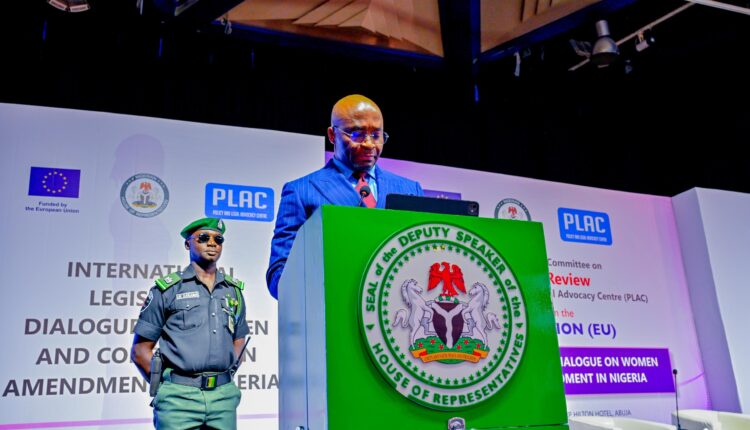Achieving LG Reform Requires Collective Effort of the Three Arms of Govt, States, CSOs, Others -Kalu
The Deputy Speaker of the House of Representatives, Hon. Benjamin Okezie Kalu, has emphasized the need for a coordinated effort among stakeholders to achieve meaningful reform in Nigeria’s local government system.
Kalu made the submission while delivering his welcome address at the national dialogue on local government and constitution amendment organized by the House of Representatives Committee on Constitution Review on Monday in Abuja.
Delivered on his behalf by the Majority Leader of the House, Professor Julius Ihonvbere, Kalu noted that local governments play a crucial role in delivering essential services, promoting inclusion, and enhancing democratic participation.
He however lamented that the current state of local government councils and areas in Nigeria is less than ideal, with issues such as limited autonomy, constrained financial independence, and weakened administrative capacity hindering their effectiveness.
The Deputy Speaker said that the national dialogue offers a platform for stakeholders to deepen their understanding of the issues, align their strategies, and build a coalition to champion the cause of local government reform.
He said: “Today, we convene not only to discuss a critical aspect of governance but also to reaffirm our collective commitment to advancing democratic principles and sustainable development at the grassroots level.
“This convening exemplifies the importance of collaboration and
dialogue in addressing national challenges. Local governments, as the closest tier of government to our citizens, are pivotal in ensuring the delivery of essential services, ensuring inclusion, and enhancing democratic participation.
“However, as we are all acutely aware, the current state of local government councils and areas in Nigeria leaves much to be desired. Issues of limited autonomy, constrained financial
independence, and weakened administrative capacity have continued to hinder their effectiveness.
“The task before us today is both ambitious and achievable: to

chart a clear and actionable path toward local government autonomy. This requires us to reimagine the role of local
governments as independent and effective partners in Nigeria’s
governance structure.
“The focus areas for this dialogue—ranging from financial and administrative autonomy to constitutional amendments in that regard—are not just technical necessities; they are foundational
to a governance system that is equitable, inclusive, and accountable. Achieving these reforms will require a coordinated
effort among federal and state governments, lawmakers, judicial
bodies, civil society organizations, traditional leaders, and local
communities.
“However, this national dialogue offers us an invaluable opportunity to deepen our understanding, align our strategies, and build a coalition of stakeholders who will champion this cause at every level.”
The Deputy Speaker also referenced the recent Supreme Court judgment reaffirming the importance of democratic principles in local government administration, which emphasized that local government councils and areas must be democratically elected, and their statutory allocations paid directly to them.
“This ruling underscores the importance of ensuring that governance at all levels adheres to democratic principles and serves the people’s best interests. Yet, to fully realize the intent and impact of
this landmark decision, we must confront the systemic issues that
have long plagued local government administration”, Kalu said.

